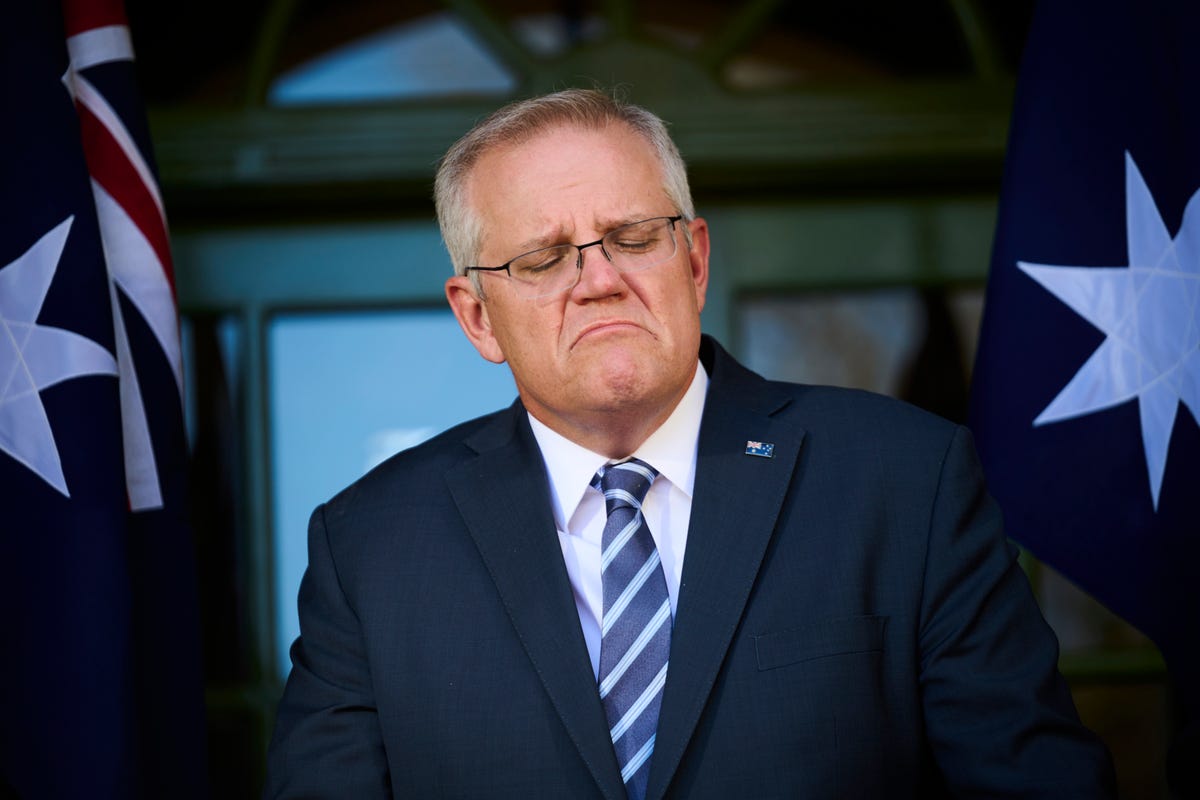
Calls to ID social media users is just another Morrison government rush job

Image: Getty Images
Every now and then, someone in power has a sook about a bad experience on social media. Then, as regular as a cuckoo clock, there’s a call for every social media user to be identified, because they reckon anonymity is the problem.
Right now the cuckoo is the Australian government, and boy are they ramping up the rhetoric.
Last Thursday, Prime Minister Scott Morrison and two other senior ministers called on the tech giants to identify their users, telling them that if they didn’t do so then they were no longer platforms, immune from prosecution. They would be publishers, subject to Australia’s tough defamation laws.
Social media is a “coward’s palace”, Morrison said.
First out the little wooden door had been Deputy Prime Minister Barnaby Joyce who was, quite understandably, angry that rumours about his daughter had been published.
Joyce told ABC Radio that the government and others around the world now have the motivation to say, “We’ve had enough, you can’t treat us like fools”.
“We spend billions of dollars in Australia on mental health issues — Facebook, Twitter and other online platforms make billions of dollars profit from selling a product that I believe in many instances, if it was a food product, it would be taken off the shelf,”
Then on Sunday, the baton was handed to Communications Minister Paul Fletcher.
“We expect a stronger position from the platforms,” Fletcher told ABC TV’s Insiders on Sunday.
“For a long time, they’ve been getting away with not taking any responsibility in relation to content that’s posted on the sites,” he said.
The attorneys-general around Australia are already leading an “existing process” to look at these issues.
“Commonwealth Attorney-General, my colleague Michaelia Cash, just this week wrote to the state attorneys-general wanting to accelerate that process,” Fletcher said.
“Tell me who you are” is a flexing of power
Back in March, forcing social media users to identify themselves was one of the 88 recommendations in a report by a parliamentary inquiry into family, domestic and sexual violence.
“In order to open or maintain an existing social media account, customers should be required by law to identify themselves to a platform using 100 points of identification, in the same way as a person must provide identification for a mobile phone account, or to buy a mobile SIM card,” it said.
The platforms would have to provide those details when requested by the eSafety Commissioner, law enforcement, or as directed by a court.
But while anonymity is certainly used as a cover for abusive behaviour, at least some of the time, would demanding ID actually solve the problem?
According to Elise Thomas, an open-source intelligence analyst at the Institute for Strategic Dialogue, that’s far from clear. After all, Facebook for one already has a real-names policy.
“A cursory glance through Facebook comments on any controversial topic will indicate that many people are only too happy to make cruel comments under their own names,” Thomas wrote at The Strategist.
“It’s not clear how a requirement to provide a driver’s licence or other ID to open an account would change that behaviour.”
Nor would it necessarily be a “proportionate or effective” policy response.
“A high bar for evidence of necessity, safety and effectiveness should be required before the government asks Australians to accept a measure which almost no other country has imposed,” Thomas said.
As she notes, there have been criticisms that real-names policies disproportionately impact marginal communities and endanger victims of domestic violence and stalking.
In the US, the Electronic Frontiers Foundation has documented a variety of harms that real-names policies can cause.
It’s sometimes argued that while the platforms could demand ID, the users could still post under a pseudonym.
But the platforms would hardly push back against demands from government, or from powerful people with expensive lawyers. Shielding users’ privacy against legal demands costs money and antagonises governments that are already keen for tighter regulation.
Moreover, just as in every other aspect of society, the platforms are more likely to respond to complaints from the powerful and the privileged, rather than the marginalised. Just ask any woman who’s been the subject of abuse, or a person of colour, or someone from the LGBTQI+ communities.
As always, “I need to know your name” only works to allow the powerful to exert power.
Thomas also noted the human rights aspects of all this.
Concerned about election misinformation, South Korea in 2004 demanded ID before posting on election websites. That was later extended to all sites with more than 300,000 daily visitors.
“Studies show that during the time the policy was in operation, there was no significant decrease in online abuse,” she wrote.
“What did happen, however, was a massive hack in which 35 million South Koreans national identification numbers were stolen.”
South Korea’s policy was ruled unconstitutional. Anonymity, or using a pseudonym, allowed people to “voice criticism on majority opinion without giving into external pressure,” the court said.
Meanwhile in Europe, a German court ruled Facebook’s policy illegal.
“In 2021, the only country imposing a requirement for government identification on social media users is China, where privacy rights and the effects on democratic free speech are clearly not a concern,” Thomas wrote.
That should tell you something.
Logical fallacies, and another Morrison government rush job
Like so much of the government’s internet-related policy, this demand for identification feels like another instance of that old logical fallacy: Something must be done. This is something, therefore this must be done.
Joyce said that if social media companies were smart enough to make so much money, then they were smart enough to make their products safer.
That’s a bit like saying that if you’re smart enough to design an apartment building then you’re smart enough to perform open-heart surgery. Or turn lead into gold.
Then there’s the sudden rush, with multiple ministers on the message within days.
Fletcher was pushing the message that efforts to regulate Facebook and Twitter would be like the News Media Bargaining Code, where work started back in 2018 and led to a result.
Joyce, however, is as usual on a different page.
“This time, something’s going to happen,” he said, legislation would be coming “soon”.
Victims of anonymous abuse who have been calling for action might be happy, but they might also wonder “Why now?” That’s easy to explain.
The attack on Joyce’s daughter kicked them in the politicals, and there’s an election coming up.





